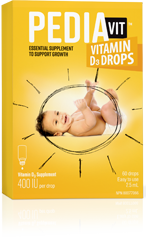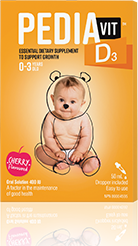With so much information out there about vitamins and minerals, it quickly becomes overwhelming. PediaVitTM believes making things as simple as can be is the best way to help parents.

Vitamin D helps in the development and maintenance of bones and teeth, and in the absorption and use of calcium and phosphorus. Health Canada recommends giving breastfed babies 400 IU (10 mcg) of vitamin D per day until the age of 1, or until the infant’s diet includes at least 400 IU (10 mcg) of vitamin D from other sources.
Rickets – a disease that develops as the result of vitamin D deficiency – can affect bone growth in children. Most cases of rickets can be treated with vitamin D supplements. Be sure to consult your doctor and follow the recommended dose (there is such a thing as too much of a good thing).
intake of dietary vitamin D is 10 mcg for infants aged 0–12 months and 15 mcg for children aged 1–3.


PediaVitTM Vitamin D3 Drops and PediaVitTM D3

Vitamin A is a building block of your child’s well-being. Vitamin A is fat-soluble, meaning it can be stored in the body and released as needed. It helps to maintain eyesight, skin membranes and immune function, as well as in the development and maintenance of night vision, bones and teeth! Needless to say, growing bodies need vitamin A to do their job.
There are several kinds of vitamin A. To standardize the way it is measured, Health Canada uses a measurement called “retinol activity equivalents” (RAE).
intake of dietary vitamin A is 300 mcg RAE for children aged 1-3.

Vitamin C is another famously important vitamin and is an anti-oxidant for the maintenance of good health. It helps in the development and maintenance of bones, cartilage, teeth and gums, in connective tissue formation and wound healing. Vitamin C also helps the body metabolize fats and proteins.
Vitamin C is water-soluble, which means the body does not store it, and any extra intake leaves the body. That means your kiddo needs vitamin C every day.
intake of dietary vitamin C is 15 mg per day for children aged 1-3.

Iron is a factor in the maintenance of good health. It helps to form red blood cells (which move oxygen around the body) and helps in their proper function.
When iron levels are on the low side, a condition called anemia can happen. It manifests by slowed growth and development, lack of appetite and energy, difficulty concentrating, irritability and infections that keep coming back.
Iron is important. If you aren’t sure if your little one is getting enough iron through diet alone, talk to your doctor about adding an iron supplement.
intake of dietary iron is 11 mg for infants aged 7-12 months and 7 mg for children aged 1-3.